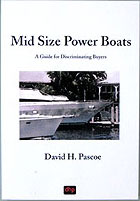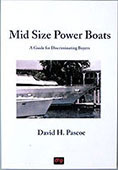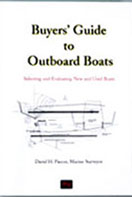Chapter 14
The Art of the Deal
Table of Contents
Hull Identification Numbers
(HIN)
Federal Documentation
Getting Into the Right Frame of Mind
Boat Shows
New Boats
How About Demos?
Seasonal Leftovers
Buying a Trade-In
Dealerships
Optional Equipment
Dealer Markup
Selecting a Dealer
Used Boats
Beginning the Search
Locating Boats
Brokerage Boats
Transacting the Sale - Used Boats
For Sale, OBO
Seller's Expense, Buyer's Expense
OBO Contracts
Co-ownership
Boat Fraud
Excerpt
Considering the high value of boats, buying one is a lot easier than buying real estate and normally with far fewer pitfalls.
While many buyers of mid size boats are moving up from smaller boats, many will be encountering the world of yacht brokers and federally documented vessels for the first time, so I'll discuss these issues too.
Hull Identification Numbers (HIN)
One of the first things you should know about used boats concerns the model year and date of manufacture.
Most people just look at the last two digits and assume that that is the boat's year. Not so. The last two digits are the Model year which may not the same as the year it was built.
The third digit from the right is the actual year of build. The letter preceding this is the month of build.
Thus, a number ABC1001B889 indicates that the boat hull was molded in February, 1988 as a 1989 model year.
If you were purchasing that boat in December, 1989, you could be looking at a boat that is nearly two years old.
You already know that some builders are putting out new boat models a half year in advance, so that it is entirely possible to mistake the actual age of a boat by as much as 2-1/2 and it would all be legal!
When it comes to used boats, if this is of particular importance to you, try to find out when the boat was originally sold.
Often times a call to the builder will net the date on which the boat was sold to the dealer, and who that dealer was.
Most have the info computerized and will readily give it out over the phone. Or, you may find, as I often do, a packet of manuals that will reveal the date the boat was commissioned or similar dates on commissioning invoices.
Federal Documentation
The desirability of federal documentation ebbs and flows around federal tax laws that change almost as rapidly as the weather.
The term we use to describe this is simply, "documented." At the time of this writing, there are few, if any, significant benefits to documentation.
One of these applies mainly to lenders when a mortgage is involved. Many lenders will require documentation as a requirement for the mortgage and the reason why is called a First Preferred Ship's Mortgage which gives the lender first claim on the vessel as collateral over and above any and all other claims that might be levied against a vessel. So if your lender insists on documentation, now you know why.
What differentiates documentation from state registrations is that any claims against the vessel, say liens against unpaid boat yard services must be filed and recorded against the document through a federal court.
- A Guide to Discriminating Buyers
by David H. Pascoe
Soft Cover
512 pages
Publisher: D. H. Pascoe & Co., Inc.
Published: 2003
Language: English
ISBN-10: 0965649636
ISBN-13: 9780965649636
In Stock
David Pascoe - Biography
David Pascoe is a second generation marine surveyor in his family who began his surveying career at age 16 as an apprentice in 1965 as the era of wooden boats was drawing to a close.
Certified by the National Association of Marine Surveyors in 1972, he has conducted over 5,000 pre purchase surveys in addition to having conducted hundreds of boating accident investigations, including fires, sinkings, hull failures and machinery failure analysis.
Over forty years of knowledge and experience are brought to bear in following books. David Pascoe is the author of:
- "Mid Size Power Boats" (2003)
- "Buyers’ Guide to Outboard Boats" (2002)
- "Surveying Fiberglass Power Boats" (2001, 2nd Edition - 2005)
- "Marine Investigations" (2004).
In addition to readers in the United States, boaters and boat industry professionals worldwide from over 70 countries have purchased David Pascoe's books, since introduction of his first book in 2001.
In 2012, David Pascoe has retired from marine surveying business at age 65.
On November 23rd, 2018, David Pascoe has passed away at age 71.







Normally orders ship the same day, if placed before 12:00 PM Eastern time.